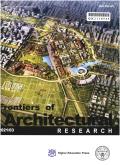尼日利亚约鲁巴人乡土建筑的建筑哲学表达与交流
IF 3.6
1区 艺术学
0 ARCHITECTURE
引用次数: 0
摘要
本文研究了约鲁巴建筑哲学是如何通过他们的乡土建筑来表达和交流的,尽管它在现代的存在逐渐减少。采用问卷调查、访谈和观察表的混合方法。采用分层随机抽样技术,选取240名调查对象。其中,168份问卷被退回,回复率达70%。我们还进行了一次结构化的采访,让人们对约鲁巴本土建筑背后的建筑理念有了更清晰的了解。为了展示使用SPSS进行的分析结果,我们创建了表格和图表并将其纳入报告中。研究发现,约鲁巴本土建筑表达了一系列超越美学和艺术形式的建筑哲学。然而,由于传统建筑的拆除和翻新,许多这些哲学都面临着灭绝的危险。这凸显了在现代设计中保护和推广约鲁巴建筑遗产的重要性,以确保其文化意义的保存。研究得出的结论是,将这些传统元素融入当代建筑是至关重要的,这样才能让约鲁巴的建筑哲学继续得到表达,并与后代交流。本文章由计算机程序翻译,如有差异,请以英文原文为准。
Expression and communication in architecture philosophy of vernacular architecture of the Yorubas in Nigeria
This paper investigated how Yoruba architectural philosophy was expressed and communicated through their vernacular architecture, despite its gradually diminishing presence in modern times. A mixed-method approach involving questionnaire, interview, and observation checklist was adopted to achieve this. Using the stratified random sampling technique, a sample size of 240 respondents was selected. Of these, 168 copies of the questionnaire were returned, resulting in a 70% response rate. A structured interview was also conducted, which provided a clearer understanding of the architectural philosophy behind Yoruba vernacular architecture. To present the results of the analysis conducted using SPSS, tables, and charts were created and incorporated into the report. The study found out that Yoruba vernacular architecture expresses a range of architectural philosophies beyond aesthetics and art form. However, many of these philosophies are at risk of going into extinction due to the demolition and renovation of traditional buildings. This highlights the importance of preserving and promoting Yoruba architectural heritage in modern designs, to ensure the preservation of its cultural significance. The study concluded that it is crucial to integrate these traditional elements into contemporary architecture, to allow the Yoruba architectural philosophy to continue to be expressed and communicated to future generations.
求助全文
通过发布文献求助,成功后即可免费获取论文全文。
去求助
来源期刊

Frontiers of Architectural Research
ARCHITECTURE-
CiteScore
6.20
自引率
2.90%
发文量
430
审稿时长
30 weeks
期刊介绍:
Frontiers of Architectural Research is an international journal that publishes original research papers, review articles, and case studies to promote rapid communication and exchange among scholars, architects, and engineers. This journal introduces and reviews significant and pioneering achievements in the field of architecture research. Subject areas include the primary branches of architecture, such as architectural design and theory, architectural science and technology, urban planning, landscaping architecture, existing building renovation, and architectural heritage conservation. The journal encourages studies based on a rigorous scientific approach and state-of-the-art technology. All published papers reflect original research works and basic theories, models, computing, and design in architecture. High-quality papers addressing the social aspects of architecture are also welcome. This journal is strictly peer-reviewed and accepts only original manuscripts submitted in English.
 求助内容:
求助内容: 应助结果提醒方式:
应助结果提醒方式:


